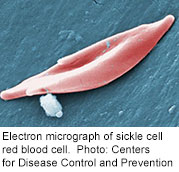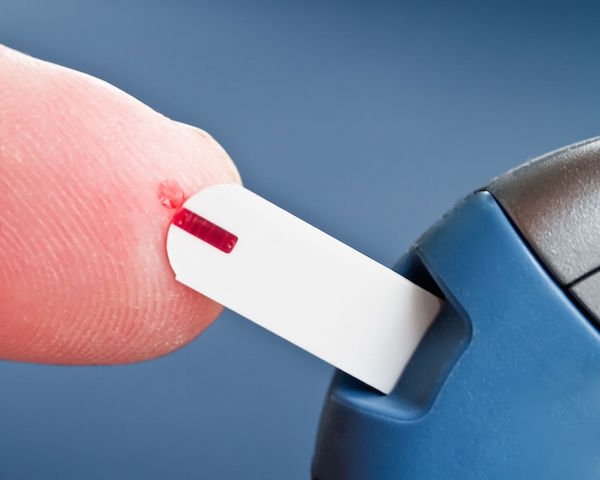
FRIDAY, Dec. 28 (HealthDay News) — Though heart problems or heatstroke generally are to blame for a young athlete’s sudden death, experts now know that carrying an aberration called the sickle cell trait also poses substantial risk.
That has led to mandatory screening for anyone hoping to participate in National Collegiate Athletic Association Division I athletics. Not everyone, however, thinks that’s a good idea.
Having the sickle cell trait is different from having sickle cell disease. People with the sickle cell trait inherited a sickle cell gene from one parent, but not both. Because they just inherited one gene, they won’t have sickle cell disease, which develops because of abnormal red blood cells that can lead to anemia, pain, infection, and organ damage.
In the United States, an estimated one of every 500 blacks and one of every 36,000 Hispanics have sickle cell disease.
By contrast, one of every 12 blacks has sickle cell trait, although most people with the trait never show signs or symptoms of the disease, according to the U.S. Centers for Disease Control and Prevention.
The exception to this is when a person with the sickle cell trait becomes dehydrated and experiences low oxygen levels — a condition that can develop when someone who hasn’t been especially athletic suddenly participates in intense exercise, such as military boot camp or pre-season training for athletic competitions.
“In military personnel, they found a 30-fold increase in the risk of sudden death for people with sickle cell trait who were in boot camps,” explained Dr. Robert Dimeff, medical director of sports medicine at the University of Texas Southwestern Medical Center at Dallas.
The sudden death of a college football player with the sickle cell trait prompted the NCAA policy in 2010. Now, all Division I athletes must have what’s known as a sickle cell solubility test as part of their routine physical examination. Players who were tested at birth as part of newborn screening programs can opt out if they have proof of that test. Athletes also can refuse the test, but if they do, they must sign a liability release form.
If testing detects the sickle cell trait, the NCAA advises the athlete’s coaches and trainers to learn the symptoms of potential trouble for someone with the trait. Recommendations include allowing longer periods of rest and recovery, encouraging the athlete to report any symptoms without fear of punishment, adjusting the workout in conditions of extreme heat or high altitude, and emphasizing hydration.
“I want my athletic trainers and coaches to know who to watch early on,” Dimeff said. “It just helps to have that information. Our goal is not to exclude athletes. We want to know who has risks and how to minimize those risks. We want you to be able to play in a way that’s safe.”
Some don’t believe, though, that mandatory screening is the best way to accomplish this. According to the American Society of Hematology, “screening for sickle cell trait should be voluntary and should take place in a setting that ensures privacy and is performed by a knowledgeable provider who is able to offer comprehensive counseling.”
“Our concern is that this is a mandatory screen in order to play,” said Dr. Janis Abkowitz, the society’s president-elect and head of the hematology division at the University of Washington in Seattle. “If a player refuses the screen, they have to sign off on a liability waiver, and there’s a lot of inconsistency in these waivers from college to college.”
And, the fact that the policy is mandatory, she said, has led to some misunderstandings.
“The policy gives a false impression that sickle cell trait is what really counts in these sudden deaths because that’s what’s screened for,” but other conditions can cause sudden death, Abkowitz said.
The top four causes of non-traumatic sports death, in order of occurrence, according to the National Athletic Trainers Association, are heart conditions, heatstroke, sickle cell trait complications and asthma.
Abkowitz also pointed out that the NCAA policy has some unintended consequences. “Some people with sickle cell trait have misunderstood the screening policy and think they can’t participate in exercise,” she said. “But, regular exercise in a normal form is good and healthy.”
A better solution would be to “implement preventive measures that would protect all athletes,” she said.
Abkowitz noted that even the U.S. Army has stopped mandatory screening for the sickle cell trait. Instead, they monitor all new recruits undergoing vigorous training for heat illness, adjust the work-rest schedule to the environment and have implemented guidelines for staying well hydrated. And, Army personnel are now trained in recognizing and treating heat illness.
“Our hope is that the NCAA will consider our concerns, note the unintended consequences of their policy and see this as an opportunity to implement preventive measures that would protect all athletes, making universal screening unnecessary,” Abkowitz said.
More information
The U.S. Centers for Disease Control and Prevention has more about sickle cell trait.
What’s the difference between sickle cell disease and sickle cell trait? Find out here.

